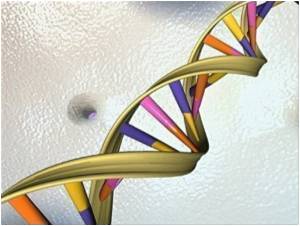
"Genome analysis can play a role at multiple time points during a patient's treatment, to identify 'driver' mutations in the tumour genome and to determine whether cells carrying those mutations have been eliminated by treatment."
This work is helping to guide the design of future cancer clinical trials in which treatment decisions are based on results of sequencing, said Mardis, affiliated with the Siteman Cancer Center at the School of Medicine and Barnes-Jewish Hospital.
To date, Mardis and her colleagues have sequenced all the DNA - the genome - of tumour cells from more than 700 cancer patients. By comparing the genetic sequences in the tumour cells to healthy cells from the same patient, they can identify mutations underlying each patient's cancer.
Already, information gleaned through whole-genome sequencing is pushing researchers to reclassify tumours based on their genetic makeup rather than their location in the body.
In patients with breast cancer, for example, Mardis and her colleagues have found numerous driver mutations in genes that have not previously been associated with breast tumours.
Advertisement
"We are finding genetic mutations in multiple tumour types that could potentially be targeted with drugs that are already available," Mardis said.
Advertisement
While clinical trials typically involve randomly assigning patients to a particular treatment regimen, a personalized medicine approach calls for choosing drugs based on the underlying mutations in each patient's tumour.
"Having all treatment options available for every patient doesn't fit neatly into the confines of a carefully designed clinical trial," Mardis acknowledged.
"We're going to need more flexibility."
When during the course of cancer mutations develop also is likely to be important in decisions about treatment.
In a recent study, Mardis and her team mapped the genetic evolution of leukaemia and found clues to suggest that targeted cancer drugs should be aimed at mutations that develop early in the course of the disease.
Using "deep digital sequencing," a technique developed at The Genome Institute, they sequenced individual mutations in patients' tumour samples more than 1,000 times each.
This provides a read-out of the frequency of each mutation in a patient's tumour genome and allowed the researchers to map the genetic evolution of cancer cells as the disease progressed.
They found that as cancer evolves, tumours acquire new mutations but always retain the original cluster of mutations that made the cells cancerous in the first place.
Their discovery suggests that drugs targeted to cancer may be more effective if they are directed toward genetic changes that occur early in the course of cancer.
Drugs that target mutations found exclusively in later-evolving cancer cells likely may not have much effect on the disease because they would not kill all the tumour cells.
Mardis said that sequencing the entire genome of cancer cells is essential to piecing together an accurate picture of the way cancer cells evolve. If the researchers had sequenced only the small portion of the genome that involves genes, they would not have had the statistical power to track the frequency of mutations over time. (Only 1 to 2 percent of the genome consists of genes.)
In another study, a phase III clinical trial of post-menopausal women with estrogen-receptor positive breast cancer, the Washington University researchers have shown that sequencing can help to predict which women will respond to treatment with aromatase inhibitors.
Interestingly, by sequencing patients' breast tumours before and after aromatase inhibitor therapy, the researchers identified substantive genomic changes that had occurred in responsive patients, whereas the genomes of unresponsive patients remained largely unchanged by the therapy.
In addition, the researchers have identified a series of mutations in the breast tumours that have corresponding small-molecule inhibitor drugs that target defective proteins.
This finding indicates that for women who are not responding to aromatase inhibitors, treatment options may include combining conventional chemotherapy with the indicated small-molecule inhibitor.
Source-ANI















